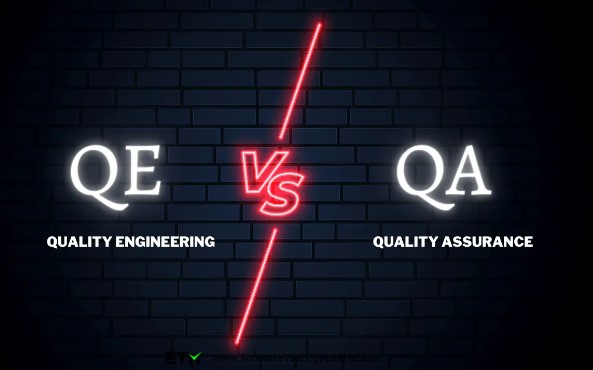Quality Engineering vs. Quality Assurance- 6 Essential Differences You Need to Know

You can’t win today’s tech savvy customers without a secure and flawless user experience (UX) across different channels and devices. You can’t release an application or service that’s low on performance, security or user experience. Any software bug could cause a loss in revenue and attract bad reviews.
You must do thorough testing before every release. This is where quality assurance (QA) and quality engineering (QE) can help you. But businesses are often confused about making the right choice.
So, what’s the real difference? This blog explores the essential differences between QA and QE. It’ll help you understand why both are vital for success in today’s fast-paced development landscape.
What is quality assurance?
QA can help you monitor and boost the processes used to build a software product. It can speed development and help you meet company or industry quality standards. QA ensures that the processes in place can create a high-quality product.
Key responsibilities of QA:
- Preventing defects
QA teams work to identify and resolve potential issues before they occur.
- Process auditing
They conduct audits of the development process to ensure it meets quality standards.
- Compliance checks
QA helps you develop software according to industry regulations and standards. This is important, especially in sectors like healthcare, finance, utilities, or aerospace.
- Documenting best practices
QA teams create and update docs on best practices. They guide developers and testers. This also speeds up future development and testing processes.
What is quality engineering (QE)?
Quality engineering embeds quality from the planning phase of the development process. It goes beyond monitoring the process. QE takes a more active role in designing systems. It automates tests to ensure the product is of the highest quality.
While QA helps you prevent software glitches, QE ensures innovation and efficiency. Quality engineers collaborate with developers at every stage of development. These stages include planning and design to final testing and deployment. Collaborating with developers can help you test the code. It will streamline testing in the development pipeline. It will also help you find and fix issues at an early stage and cut the costs of development.
Key responsibilities of QE:
- Automation of testing
QEs design automated testing frameworks to catch bugs early in the process.
- Continuous integration
They help integrate testing into development. This ensures that we check every code change for quality.
- Performance testing
QE teams ensure that products work and perform well in all conditions.
- Collaboration with developers
QE collaborates with developers to establish a shared responsibility for quality.
Quality engineering is tech-focused. It aims to build systems that ensure quality through automation. This will eliminate the need for later manual checks.
The essential differences between QA and QE
Now that we’ve explained both QA and QE, let’s dive into the key differences:
1. Focus
QA: Focuses on improving processes to ensure product quality.
QE: Focuses on building systems and automation to ensure quality is built into the product from the start.
2. Approach
QA: Process-driven, focusing on prevention and compliance.
QE: Engineering-driven, it focuses on efficiency and integrating quality throughout the development pipeline.
3. Involvement in development
QA: Works at specific stages of development, particularly during the testing phase.
QE: Involved from start to finish, from design to deployment.
4. Automation
QA: It may use manual or automated testing. But it often focuses on using the right testing processes.
QE: Creates automated systems that ensure quality while minimizing human intervention.
5. Skillset
QA: This role requires knowledge of industry standards and manual testing. It also needs skills in process improvement.
QE: Requires skills in coding, test automation, continuous integration tools, and performance analysis.
6. Goal
QA: Ensures that the processes in place will result in a quality product.
QE: Optimizes every part of the product’s lifecycle for quality through engineering practices.
Read also: The Technology Powering Trading Signals in Binary Options: a Deep Dive
Why are both QA and QE important?
QA and QE are often used interchangeably, but they are not the same. Both enhance quality, but they complement each other.
QA provides a structured framework that ensures teams adhere to processes with precision. This is vital for businesses that must follow strict regulations or standards.
QE brings in expertise to make quality a key part of development. It can help businesses where speed and automation are key to staying competitive. These domains could be software development or manufacturing.
By using both QA and QE, you can build robust processes and a high-quality product from the ground up.
How to choose between QA and QE for your company
You need quality engineering and testing services to deliver robust products. But you might not decide on the best approach for your business. The truth is most companies benefit from a combination of both QA and QE.
Here are some tips to help you decide:
QA is good for businesses like healthcare or finance. They must meet strict regulations and laws.
For a gaming or software dev business, QE can help you. It will let you deliver high-quality products faster.
Fast-growing businesses should adopt QE to automate repetitive tasks. It can help them focus on more complex problems.
Conclusion
Both QA and QE are vital for your digital products’ quality. QA focuses on the processes that help in building a great product. But QE takes a hands-on approach. It builds systems that integrate quality from the start. Using both approaches can help you build strong, low-cost systems.
If you want to partner with a reliable and experienced QE partner, Qualitest is the right choice. Our expert quality engineers have decades of QA and QE experience. We can help you. We’ll ensure your business. We’ll harness AI, automation, and next-gen testing. We want a culture of quality orchestration across business, tech, and ops.
